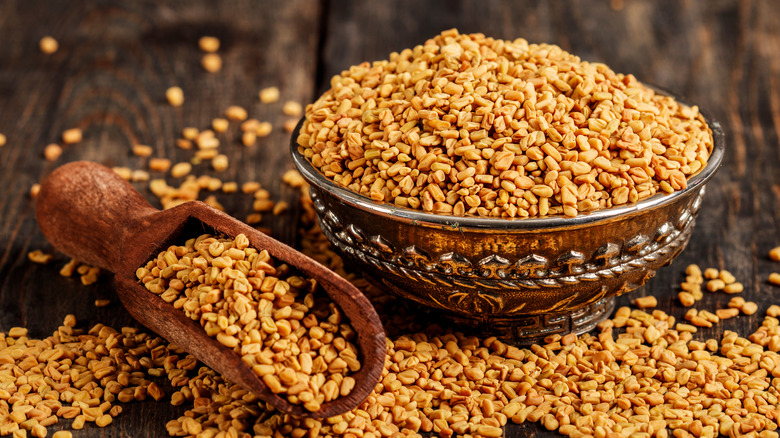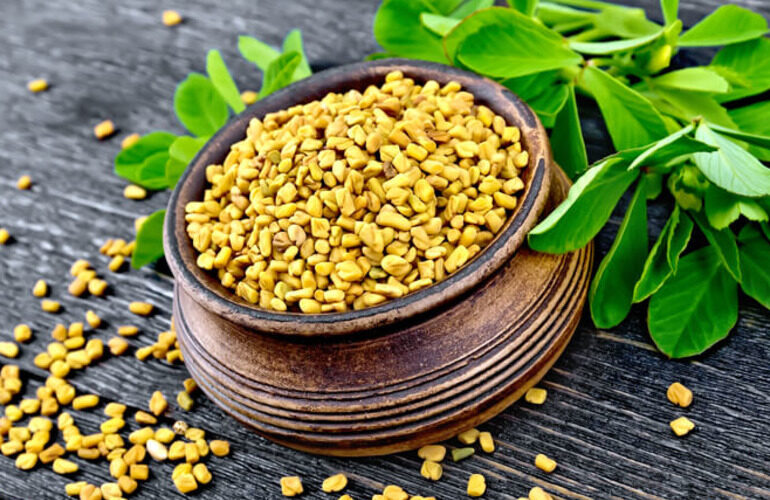Welcome to the riveting world of Ayurvedic herbs, a treasure trove of nature’s wisdom and healing secrets. Today, let’s delve into the mystical journey of one of the oldest and most revered Ayurvedic herbs – Fenugreek. Fenugreek is a household name in the culinary world, but a well-kept secret in the wellness realm, fenugreek is making waves for its myriad health benefits.
Fenugreek, scientifically known as Trigonella foenum-graecum, is a beloved spice and legume enhancing the sensory quality of foods across various cultures and cuisines.
This annual plant in the Fabaceae family is widely cultivated as a semi-arid crop. Its seeds and leaves are prevalent ingredients in various culinary traditions worldwide.

Some notable cultures that incorporate fenugreek into their cuisines include:
- Indian Subcontinent: Fenugreek seeds are frequently encountered in the cuisines of the Indian subcontinent, used both whole and powdered in the preparation of pickles, vegetable dishes, and dal. In addition, it’s a key ingredient in spice mixes such as panch phoron and sambar powder. Fresh leaves are also an ingredient in some curries like “aloo methi” (“potato fenugreek”) curry.
- Armenian Cuisine: In Armenian cuisine, fenugreek seed powder is used to make a paste, an important ingredient in preparing basturma, a dried and cured beef dish.
- Iranian Cuisine: In Iranian cuisine, ground fenugreek forms part of a mixture of vegetables and herbs used to cook the vegetable stew known as Ghormeh Sabzi. Fenugreek beans also feature in a fresh salad called Sabzi Khordan.
- Yemeni Cuisine: Fenugreek is integral to the national dish of Yemen. Saltah is a beef stew prepared with a fenugreek-infused sauce known as hulbah. The stew is served with rice, potatoes, or vegetables and eaten with Yemeni flatbread.
- Georgian and Caucasus Region: Fenugreek is included in the spice mixture Khmeli suneli, which features dried fenugreek leaves or plants.
- Ethiopian Cuisine: Fenugreek is part of a spice mix called Berbere or Berber in Ethiopia. The mix includes a range of spices such as dried red chilies, cumin, coriander, cloves, allspice, black pepper, cardamom, ground ginger, nutmeg, and salt.
- Moroccan Cuisine: Fenugreek is also a part of the popular Moroccan spice mix Raz el Hanout, which contains a variety of spices, including black pepper, coriander, cumin, cloves, cardamom, turmeric, cinnamon, ground ginger, nutmeg, red chilies.
Therefore, fenugreek’s gastronomic influence is truly global, spanning from the Middle East and Africa to Asia and Europe, a testament to its unique flavor profile and versatility in different dishes.
But it’s the benefits of fenugreek that are truly astonishing. The seeds of this plant are no less than tiny nuggets of gold, offering profoundly significant health advantages.
But what are these fenugreek benefits? And, more importantly, how are they relevant to both men and women?
Biological Constituents Of Fenugreek
Before we can delve into the benefits of these tiny gold nuggets called Fenugreek, we must know the Biological Constituents inside.
Fenugreek (Trigonella foenum-graecum L.) is truly a wonder of nature. Fenugreek is known for its versatility; the seeds contain many biologically active compounds with remarkable health benefits. Let’s take a closer look at these compounds and the amazing benefits they offer.
- Volatiles: Notable volatile compounds in fenugreek seeds include Eugenol and Linalool. Eugenol has been found to exhibit antioxidant, antimicrobial, antiseptic, anti-inflammatory, and analgesic properties. Similarly, Linalool also shows a range of medicinal properties, including antioxidant, antimicrobial, and anti-inflammatory activity.
- Flavonoids: Flavonoids such as Quercetin, Rutin, Vitexin, and Isovitexin in fenugreek seeds have impressive health benefits. They are known for their antioxidant and anti-inflammatory effects. They also exhibit anticancer, neuroprotective, cardioprotective, and antihyperalgesic properties.
- Modified Amino acids: One modified amino acid found in fenugreek seeds is 4-hydroxy isoleucine. This compound has promising effects in managing diabetes, dyslipidemia, and obesity. Its antidiabetic property is linked to its ability to induce insulin secretion in a glucose-dependent manner.
- Alkaloids: Alkaloids like Trigonelline and Glycine-betaine in fenugreek seeds exhibit many health benefits. These include antidiabetic, antidyslipidemic, neuroprotective, antimigraine, antibacterial, antiviral, and anti-tumor activities.
- Saponins: Diosgenin is a type of saponin found in fenugreek seeds. This compound can treat various disorders, including cancer, hypercholesterolemia, inflammation, and infections.
Moreover, Diosgenin has been found to block DHT (dihydrotestosterone), a hormone linked to hair loss and prostate growth. This characteristic makes it effective against conditions like cancer, inflammation, infections, diabetes, dyslipidemia, and obesity, and acts as an antioxidant.
Nutrient Profile Of Fenugreek
The nutritional constituents of fenugreek seeds include minerals, vitamins, dietary fiber, and other beneficial compounds, each playing a significant role in promoting health.
One tablespoon (approximately 11 grams) of fenugreek seeds contains:
- 21% of iron’s Daily Value (DV).
- 6% of the DV for manganese.
- 2.5 grams of protein.
- 0.7 grams of fat.
- 6.5 grams of carbohydrates.
- 2.7 grams of dietary fiber.
- 7.4 milligrams of sodium.
- 85.5 milligrams of potassium.
Furthermore, fenugreek seeds are an excellent source of B vitamins, which have antioxidant properties essential for maintaining overall health.
These include:
- Thiamin is essential for glucose metabolism and nerve, muscle, and heart function. Riboflavin plays a role in nutrient metabolism, red blood cell production, and iron absorption.
- Vitamin B6 is crucial for immune, cardiovascular, and nerve health.
Additionally, fenugreek seeds provide abundant minerals with various health implications.
For instance, the seeds are rich in potassium, phosphorus, magnesium, zinc, and copper.
These minerals are essential for multiple biological functions, including controlling heart rate, promoting red blood cell production, building healthy bones, regulating nerve, and wound healing, hair growth and muscle activities, and aiding in nutrient absorption.
Fenugreek seeds’ high fiber content contributes to smooth digestion, relieves constipation, and better regulates blood sugar levels. The seeds also have the potential to suppress appetite due to their ability to increase the feeling of satiety.
Fenugreek’s Uses and Health Benefits
This humble herb belonging to the legume family embodies the essence of Ayurvedic healing, boasting a rich tapestry of health benefits that can touch almost every facet of human wellness.
Fenugreek’s impressive catalog of health benefits is indeed vast.
Increases Breastmilk Production
Fenugreek’s potential to increase breast milk production is well documented, creating an essential aid for new mothers. Breastfeeding mothers around the globe, including myself, sing Fenugreek’s praises for its capacity to increase breast milk production. The herb has been used for centuries in traditional medicine to boost lactation, backed by promising research indicating its substantial effect on milk yield. Thanks to the phytoestrogens it contains, Fenugreek can potentially help lactating mothers provide adequate nutrition for their little ones, with its effect noticeable within 24 to 72 hours.
Relieves Menstrual Cramps
For women enduring the monthly discomfort of menstrual cramps, Fenugreek may be the ally you’ve been seeking. Preliminary evidence suggests the herb can alleviate these discomforts, although further studies are needed to confirm this effect.
Increases Testosterone level
Fenugreek also can enhance testosterone levels by blocking DHT, making it a natural ally for male wellness.
Treatment of PCOS and Asthma
Components such as galactomannan fiber, saponin, and hydroxy isoleucine enhance its effectiveness in health benefits. Research suggests it may benefit women with conditions such as PCOS and asthma. If you’re grappling with Polycystic Ovary Syndrome (PCOS), Fenugreek may be worth considering. Ongoing research is currently evaluating its effectiveness and safety for these conditions.
Gastritis Relief
Fenugreek’s potential therapeutic effects extend to the stomach, which may offer relief to those suffering from gastritis. The potential of this Ayurvedic marvel in treating heartburn and its anti-inflammatory effects deserves an honorable mention.
Improves Appetite
The herb has been lauded for stimulating appetite.
Treatment of Type 1 and 2 Diabetes and Hypercholesterolemia
Fenugreek’s ability to regulate blood sugar levels makes it a champion for those battling diabetes. Its fiber-rich seeds support metabolic health by controlling appetite and reducing cholesterol to increase insulin release. Research has shown it can delay glucose absorption from the GI tract, making it beneficial for managing type 1 and 2 diabetes. Its potential in managing hyperlipidemia and hypertriglyceridemia could make it crucial to maintaining heart health.
Atherosclerosis, Constipation, Aluminium Toxicity, and Kidney Ailments
Fenugreek has also been studied for treating atherosclerosis, constipation, kidney ailments, and aluminum toxicity.
Local Inflammation and Memory Booster
Fenugreek’s potential extends to treating local inflammation and even as a memory booster, showing the potential to slow down memory loss.
Improves Hepatic Health
Fenugreek has potential hepatoprotective benefits, which may help protect the liver rather than harm it. Bioactive compounds in fenugreek, such as diosgenin and 4-hydroxy isoleucine, benefit various metabolic parameters, including liver function.
Smooth Skin
Interestingly, this Ayurvedic gem, when used as a face mask, can tighten the skin, adding another string to its beauty benefits bow.
Healthy Hair
Fenugreek doesn’t take a back seat regarding hair growth. These potent nutrient-dense seeds, rich in iron, manganese, and other essential nutrients, nourish the hair from within, promoting growth and combatting hair loss. Its ability to increase sebum production can reduce hair breakage, promote shine, and enhance hair resistance.
In addition to these benefits, Fenugreek is also Generally Recognized As Safe (GRAS) by the U.S. Food and Drug Administration (FDA) when used as a flavor.
So, whether you are dealing with inflammation, diabetes, dyslipidemia, or looking to boost your overall health, fenugreek seeds could be a natural and potent solution. However, as with all supplements and diet changes, please consult a healthcare provider before starting any new regimen.
Fenugreek’s Clinical Trials
The multifaceted Ayurvedic herb, Fenugreek, has taken center stage in several clinical trials due to its promising potential for managing diabetes. These trials have shed significant light on its therapeutic properties, confirming the robust capabilities of this ancient medicinal herb.
Clinical Trial #1
[Medscape News and Perspective Section]: A study spanned eight weeks with 24 type 2 diabetes patients. Participants consumed Fenugreek in powder form (10mg/day) mixed in yogurt or hot water.
The results were striking. For those who consumed Fenugreek in hot water, there was a significant reduction in fasting blood sugar (FBS), triglycerides (TGs), and very-low-density lipoprotein (VLDL) by 25, 30, and 36%, respectively.
Clinical Trial #2
[Medscape News and Perspective Section]: This two-month trial evaluated the effects of a hydroalcoholic extract from Fenugreek seeds in 25 newly diagnosed type 2 diabetic patients. Participants were divided into two groups. Group 1 was administered 1 g of fenugreek seed extract daily, and Group 2 received standard diabetic care (diet, exercise) and placebo capsules. The fasting blood sugar (FBS) after a 2hr post-blood glucose test didn’t significantly differ between the groups.
However, Group 1 participants showed a significant reduction in the area under the blood glucose and insulin curve.
Furthermore, they experienced a decrease in beta-cell secretion and an increase in insulin sensitivity. There was also a notable decline in the serum TG level and an elevation in HDL-C (High-Density Lipoprotein Cholesterol) level in Group 1.
The conclusion was clear: Fenugreek seeds could improve glycemic control and reduce insulin resistance and TG levels in mild type 2 diabetic patients.
Clinical Trial #3
[Medscape News and Perspective Section]: For this trial, Type 1 Diabetic patients were given 100g of defatted Fenugreek seeds powder at lunch and dinner in divided doses (50g/BD) for ten days. The diet was isocaloric. After ten days, patients were shown to have a decrease in FBS, an increase in glucose tolerance test (GTT), and a 54% decrease in 24h urinary glucose excretion. Total Serum Cholesterol, LDL (Low-Density Lipoprotein), and VLDL were decreased.
It’s evident from these trials that Fenugreek has multiple mechanisms of action that improve glycemic control and enhance lipid profiles.
The trials underscore the anti-diabetic properties of Fenugreek and highlight the need for further high-quality studies to confirm these effects and establish standardized dosage. All these trials together substantiate the role of Fenugreek as a viable, natural agent for diabetes management.
Fenugreek’s Side Effects and Interactions
While Fenugreek is a storehouse of health benefits, it’s essential to understand that, like any herb, it should be consumed under professional guidance when used to treat a particular illness. It may interact with certain medications.
In this review, I must highlight that while Fenugreek is a versatile herb known for its myriad health benefits, like lowering blood sugar levels, improving sexual interest, and other health-related benefits, it can also exhibit certain side effects and interactions that users must be aware of.
These side effects can vary from individual to individual. So always consult a healthcare provider before incorporating it into your routine.
Gastrointestinal
Common side effects of digestion include diarrhea, dyspepsia, abdominal distention or bloating, especially when consumed raw as sprouts, and flatulence.
Food-Related Body Odor
Additionally, Fenugreek is known to increase perspiration and might give a maple-like or spicy smell to sweat, urine, and breast milk.
This adverse effect is one I can directly attest to this adverse effect as it occurred when I consumed fenugreek tea to increase breastmilk production.
The underlying mechanism involves aromatic compounds, notably sotolon, present in fenugreek seeds that are excreted in sweat and urine after ingestion. These compounds are responsible for the distinctive maple syrup-like or spicy odor.
A study by AgroParisTech identified eight specific compounds associated exclusively with fenugreek ingestion, including sotolon, beta-pinene, 3-octen-2-one, camphor, 2,5-dimethylpyrazine, terpinene-4-ol, 4-isopropyl-benzaldehyde, neryl acetate, and beta-caryophyllene.
Hypoglycemia
Fenugreek can result in hypoglycemia when used with anti-diabetic drugs without proper monitoring. The signs and symptoms of Hypoglycemia include excess sweating, shakiness, tachycardia, anxiety, a sensation of hunger, dizziness, weakness, confusion, difficulty concentrating, etc.
Hypokalemia
When consumed in high quantities, fenugreek can result in hypokalemia. Symptoms of hypokalemia are muscle weakness, cramps, abnormal heartbeats, and numbness or tingling in the extremities.
The properties of Fenugreek which can contribute to hypokalemia are its high source of dietary fiber, saponins, and diuretic constituents. When consumed in large quantities, excess fiber may increase the motility of the gastrointestinal tract, leading to increased bowel movements and potentially increased loss of potassium via the gastrointestinal tract. In addition, saponins in fenugreek can also increase the permeability of the intestinal wall, potentially exacerbating the loss of electrolytes, including potassium.
Moreover, fenugreek is known to have diuretic properties, promoting increased urine output. Increased diuresis may lead to excessive renal losses of potassium, another common cause of hypokalemia.
Other Side Effects
Additionally, a severe skin reaction, Toxic Epidermal Necrolysis, may occur. Fenugreek could potentially worsen asthma; in some cases, it can induce unwanted uterine contractions leading to abortion or preterm labor.
Moreover, being mindful of Fenugreek’s interactions with other medications is crucial. Fenugreek could interact with diabetes medications, blood clotting drugs, and medications like theophylline, clopidogrel, and metoprolol. Allergies may also be a concern, particularly for individuals with sensitivities to peanuts or chickpeas.
As with any therapeutic regimen, Fenugreek should be supervised by a healthcare provider. Despite its promising potential, it’s important to acknowledge that not all effects have been validated, and large-scale clinical trials are still needed. Fenugreek should not be used as a replacement for prescribed medication. A balanced approach to using this Ayurvedic herb is always recommended, keeping its potential benefits and risks in mind.
Precautions When Using Fenugreek
Fenugreek is a popular herb used in cooking and traditional medicine. However, like all substances, it should be used responsibly and with due consideration for potential side effects. Here are some precautions one should take when using fenugreek:
- Allergies: Some individuals may be allergic to fenugreek. Signs and symptoms include facial swelling, difficulty breathing, and severe rash. If you have known allergies to other legumes, such as peanuts or soybeans, you might be more susceptible to allergic reactions to fenugreek.
- Medical conditions: Fenugreek has been associated with certain health risks in people with specific medical conditions. For instance, individuals with diabetes should use fenugreek cautiously as it can lower blood sugar levels. People with hormone-sensitive cancers or conditions should also be cautious since fenugreek contains compounds that can act like estrogen.
- Pregnancy and Breastfeeding: Pregnant women should avoid fenugreek, as it may stimulate uterine contractions and lead to preterm labor. Although fenugreek is often used to increase milk supply in breastfeeding women, it’s best to do so under the supervision of a healthcare provider due to potential side effects.
- Medication interactions: Fenugreek can interact with certain medications, including anticoagulants, antiplatelet drugs, and medications used to control blood sugar. Combining these medications with fenugreek can increase your risk of bleeding or cause hypoglycemia (low blood sugar).
- Gastrointestinal issues: Consuming fenugreek can cause gastrointestinal issues in some people, such as diarrhea, bloating, and gas.
- Use in moderation: Like any herb or supplement, fenugreek should be used in moderation. High doses may cause side effects like nausea, diarrhea, or upset stomach.
- Monitor your health: If you start using fenugreek, monitor yourself for any changes in health. If you experience unusual symptoms, stop using fenugreek and seek medical attention.
Fenugreek Dosage
Fenugreek is a versatile plant, and various parts can be consumed for health benefits. However, it is essential to adhere to recommended dosages to ensure safe and effective use. The suggested dosages are as follows:
- Seeds: The recommended dosage of fenugreek seeds is 1 to 2 grams orally three times a day, with a maximum limit of 6 grams daily.
- Tea: Fenugreek tea can be consumed multiple times a day. Each cup should contain about 500mg of fenugreek seeds in 150 mL water.
For specific health conditions
Diabetes Mellitus, Postprandial Glucose Control:
- Fenugreek can be taken at 10-15g once a day or in divided doses with meals.
- Alternatively, a Hydroalcoholic fenugreek extract can be taken at 1g orally once a day.
- Fenugreek seeds can be consumed at a dosage of 5g per day.
Hyperlipidemia: For treating high cholesterol levels, the recommended dosage of fenugreek is 0.6 to 2.5 grams, taken orally twice a day with meals.
Remember, these dosages are general recommendations.
Individual needs may vary depending on age, overall health, and other conditions. Always consult with a healthcare provider before starting any new supplement regimen.
Toxicity Of Fenugreek
Like any supplement or herbal remedy, it’s possible that excessive amounts could potentially have negative effects, including on liver health. Some components in fenugreek, like alkaloids, have potential toxicity in high amounts. This high alkaloid profile could theoretically lead to liver toxicity, although this has not been demonstrated in the context of fenugreek consumption.
It’s important to note that these adverse effects are typically associated with the overuse of fenugreek and not normal, recommended usage.
- Gastrointestinal discomfort: Overusing fenugreek may cause gastrointestinal issues like diarrhea, upset stomach, and bloating. The fiber in fenugreek seeds can cause these side effects, especially if taken in large amounts.
- Hypoglycemia: Fenugreek has been shown to lower blood sugar levels. In some cases, when consumed in excess or combined with diabetes medication, it can cause hypoglycemia, a potentially dangerous condition characterized by abnormally low blood sugar levels. Symptoms of hypoglycemia include dizziness, sweating, confusion, and fainting.
- Allergic reactions: Some individuals might be allergic to fenugreek. Allergic reactions can include symptoms like rash, hives, difficulty breathing, and swelling of the face, lips, or tongue. Severe allergic reactions (anaphylaxis) require immediate medical attention.
- Pregnancy complications: Fenugreek contains compounds that can stimulate uterine contractions, and therefore, its excessive use could potentially lead to preterm labor or miscarriage. Pregnant women should avoid fenugreek without medical advice.
- Interactions with medications: Fenugreek can interact with certain medications, including anticoagulants and antiplatelet drugs, increasing the risk of bleeding.
It can also interact with diabetes and high cholesterol medications, potentially enhancing their effects and leading to hypoglycemia or other side effects.
- Hypokalemia: Excessive fenugreek use can lead to hypokalemia or low potassium levels. This decrease in potassium levels can cause symptoms like muscle weakness, irregular heartbeat, and in severe cases, can be life-threatening.
- Odor: A minor but notable side effect of fenugreek use is the distinctive and sometimes unwanted smell that it can cause in sweat and urine.
Storing Fenugreek
Proper Fenugreek storage can ensure longevity and maintain flavor and nutritional quality. Here are some tips on how to store fenugreek, both in seed form and as leaves:
Fenugreek Seeds:
- Keep fenugreek seeds in an airtight container in a cool, dark, and dry place.
- You can store them in a spice jar with a tight-fitting lid
- Avoid exposure to heat, moisture, and direct sunlight, as these conditions can degrade the quality of the seeds and lessen their flavor and potency.
Fenugreek Leaves (Fresh):
- Fresh fenugreek leaves, known as methi, should be stored in the refrigerator.
- Wash the leaves thoroughly, pat them dry to remove excess moisture, and store them in a sealable plastic bag or airtight container.
- Alternatively, you can wrap them in a damp paper towel before placing them in the bag or container, which helps to maintain their freshness.
- Fresh fenugreek leaves can typically last for about a week when stored this way.
Dried Fenugreek Leaves:
- Dried fenugreek leaves should also be stored in an airtight container in a cool, dark, and dry place.
- Proper storage will help maintain their flavor for several months.
- Avoid heat, moisture, and direct sunlight exposure as with the seeds.
Remember, regardless of the form, always check fenugreek for signs of spoilage, such as mold, a musty smell, or an off taste, before using. If any of these signs are present, it’s best to discard the fenugreek and obtain a fresh supply.
Similar Supplements
Fenugreek is often used for its potential health benefits, including improving digestive health, reducing inflammation, and helping control blood sugar levels. If you’re looking for supplements that can offer similar benefits, consider the following:
- Turmeric: Known for its potent anti-inflammatory effects thanks to its active ingredient, curcumin, turmeric is often used in supplements for reducing inflammation. Like fenugreek, it can aid in digestion and help manage blood sugar levels.
- Cinnamon: In addition to its use as both a spice and a medicinal herb, cinnamon is noted for its potential to reduce blood sugar and has a beneficial effect on type 2 diabetes. It also has anti-inflammatory properties.
- Ginger: This root is renowned for its digestive benefits, especially in easing nausea and other gastrointestinal issues. It also possesses anti-inflammatory properties.
- Garlic: The herb has been used for centuries for various health purposes; garlic can boost the immune system, reduce blood pressure, and improve cholesterol levels, which may help prevent heart diseases.
- Fennel seeds: Often used to treat various digestive problems, including heartburn, intestinal gas, bloating, and loss of appetite.
- Black seed (Nigella sativa): Black seed, or black cumin, has been used for centuries for its ability to improve immune function, and it also has anti-inflammatory and antioxidant effects.
- Ginseng: Ginseng is used for improving overall health. It can help strengthen the immune system, enhance brain function, fight fatigue, and manage blood sugar levels.
Remember, discussing any supplement with a healthcare provider is crucial, as they can provide personalized advice based on your health history and current medications. Some supplements can interact with medications or may not suit people with certain health conditions.
Sources and What to Look for When Purchasing Fenugreek
Fenugreek can be purchased from many sources. Some common places to find fenugreek include:
- Health food stores: Many health food stores will carry fenugreek in their herbs and supplements section. They may have it available in different forms, such as seeds, capsules, tea, or powder.
- Online retailers: Websites like Amazon and iHerb offer various fenugreek products from various brands. These platforms are a good option to compare different brands and products.
- Supermarkets: Many supermarkets will carry fenugreek in the spice aisle, particularly if they have a section dedicated to ethnic foods. However, the form and brand availability may be more limited.
- Pharmacies: Some pharmacies may carry fenugreek supplements, especially those with a large selection of natural health products.
- Ethnic grocery stores: Stores specializing in Indian, Middle Eastern, or Mediterranean foods often carry fenugreek seeds, as it’s commonly used in these cuisines.
When choosing fenugreek, here are a few things to look for
- Form: Decide what form you prefer — seeds, powder, capsules, or tea. Your choice might depend on how you plan to use it.
- Organic: If possible, look for organic fenugreek. Organic products are grown without the use of synthetic pesticides and fertilizers.
- Brand Reputation: Look for brands with a good reputation for quality and purity.
- Certifications: Check for certifications that assure quality, such as USP (United States Pharmacopeia), NSF International, or ConsumerLab. These organizations test supplements to ensure they contain what they claim and don’t contain harmful levels of contaminants.
- Dosage: The dosage will depend on why you’re taking fenugreek. It’s best to consult a healthcare provider for advice on the appropriate dosage.
Key Take Aways
Based on our review, here are the key takeaways about fenugreek:
- Uses: Fenugreek has a long history of use in traditional medicine. It’s often used for its potential health benefits, including improving digestive health, managing diabetes, increasing milk production in breastfeeding mothers, and promoting a healthy inflammation response. However, more research is needed to understand these effects fully.
- Forms and Dosage: Fenugreek is available in several forms, including seeds, powder, capsules, and tea. The recommended dosage can vary depending on the reason for use and the specific product. Always follow the manufacturer’s instructions or consult a healthcare provider.
- Side Effects and Precautions: While fenugreek is generally considered safe for most people, it can cause side effects such as digestive upset. People with certain health conditions or taking certain medications should be cautious. In particular, fenugreek can interfere with blood sugar control and medication for diabetes. It can also cause an allergic reaction in some people.
- Interactions with other herbs and supplements: Fenugreek may interact with other herbs or supplements that have similar effects on blood sugar, hormones, or inflammation. For example, it could enhance the effects of insulin, increasing the risk of low blood sugar.
- Storing Fenugreek: Fenugreek should be stored in a cool, dry place away from direct sunlight. If stored properly, it can last for several months.
- Choosing Fenugreek: When purchasing fenugreek, look for reputable brands and choose organic products if possible. Check the form (seeds, powder, capsules, tea) that best suits your needs.
- Similar Supplements: Other supplements may have similar benefits to fenugreek, including cinnamon, turmeric, and ginger. Always consult with a healthcare provider before starting any new supplement regimen.
Fenugreek FAQ
What are the health benefits of fenugreek?
Fenugreek has several potential health benefits. It has been used to improve digestion, manage diabetes, increase lactation in breastfeeding mothers, and promote a healthy inflammatory response. However, more research is needed to confirm these effects.
What is the recommended dosage for fenugreek?
Fenugreek dosage varies depending on the reason for use and the form of fenugreek. For example, a common recommendation for seeds is 1-2 grams orally thrice daily. However, it’s always best to follow the manufacturer’s instructions or consult a healthcare provider.
What are the side effects of fenugreek?
While fenugreek is generally considered safe, it can cause side effects such as digestive upset, a maple syrup-like smell in urine or sweat, and allergic reactions in some people.
Can fenugreek interact with other herbs or supplements?
Yes, fenugreek can interact with other herbs and supplements, especially those that affect blood sugar, hormones, or inflammation. Always consult a healthcare provider before starting fenugreek or combining it with other herbs or supplements.
How should fenugreek be stored?
Fenugreek should be stored in a cool, dry place away from direct sunlight. Properly stored, it can last for several months.
What should I look for when purchasing fenugreek?
When buying fenugreek, opt for reputable brands and consider organic products. Check the form (seeds, powder, capsules, tea) that best suits your needs.
Are there other supplements similar to fenugreek?
Other supplements may offer similar benefits to fenugreek. These include cinnamon, turmeric, and ginger. Always consult with a healthcare provider before starting any new supplement.
Can fenugreek help with diabetes management?
Some studies suggest fenugreek may help control blood sugar levels in people with diabetes, but more research is needed. Fenugreek should not replace conventional diabetes treatments unless advised by a healthcare provider.
Is fenugreek safe for breastfeeding mothers?
Fenugreek is often used to increase milk production in breastfeeding mothers. However, it’s important to consult a healthcare provider before starting fenugreek or other supplements during breastfeeding.
Can fenugreek consumption cause liver damage?
While fenugreek is generally considered safe, very high doses or long-term use could cause liver damage. Always adhere to the recommended dosage and consult your healthcare provider for any concerns.








